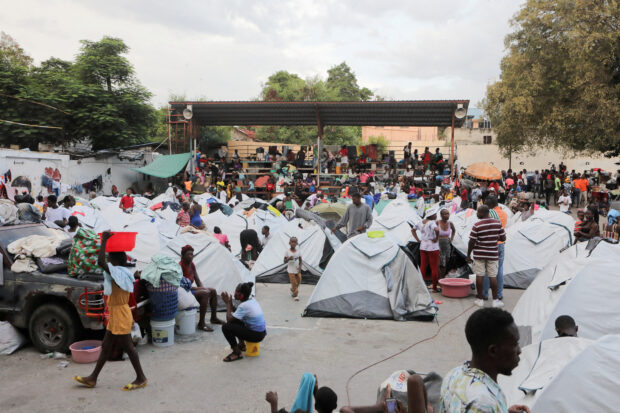Haitian gangs run schools, clinics as gov’t absent – UN report

FILE PHOTO: People fleeing gang violence take shelter at a sports arena, in Port-au-Prince, Haiti, on September 1, 2023. REUTERS/Ralph Tedy Erol/File Photo
PORT-AU-RPINCE — Haitian gangs run schools, clinics, and foundations in place of an increasingly absent government, even as their criminal rackets help gang leaders amass funds and afford luxury homes with swimming pools in the hemisphere’s poorest country.
That was one of the findings of a comprehensive United Nations report published on Wednesday.
“Gangs are getting stronger, richer, better armed and more autonomous,” according to a 156-page report from a UN experts panel. It pointed to lucrative arms trafficking largely from the United States that provides gangsters with deadly arsenals.
The panel blasted an “ineffectual” UN arms embargo and noted that few countries respond to requests to trace seized firearms.
READ: UN chief says ‘robust use of force’ needed against Haiti’s gangs
Article continues after this advertisementGangs have consolidated, coalescing in the capital around the G9 and G-Pep alliances, while fighting escalates in key northern farmlands.
Article continues after this advertisementThe report concluded that gangs frequently use rape to terrorize and extort victims, demand money, and control food supplies. They’re also blamed for carrying out indiscriminate killings and hundreds of kidnappings, demanding ransoms as high as $500,000 for foreigners and prominent figures.
READ: Haiti gang opens fire on crowd of parishioners trying to rid community of criminals
Leaders have used social foundations to project positive images. They use social media to flaunt luxury lifestyles, but also to instill terror with videos of torture and mutilations, according to the report.
Haiti’s under-funded national police are “grossly understaffed” as well as “ill-equipped and ill-trained.”
READ: Haiti gang leader vows to fight any foreign armed force if it commits abuses
Since April, a vigilante self-defense movement known as Bwa Kale has executed hundreds of suspected gang members, and the report also blames the movement for committing crimes and morphing into new gangs.
The Caribbean nation’s gangs have significantly expanded their influence in recent years, driving mass-migration and internal displacements while plunging millions into severe hunger.
The United Nations has recently ratified deploying an international force to support Haiti’s police at the government’s request, but few countries have committed personnel and it has yet to materialize.